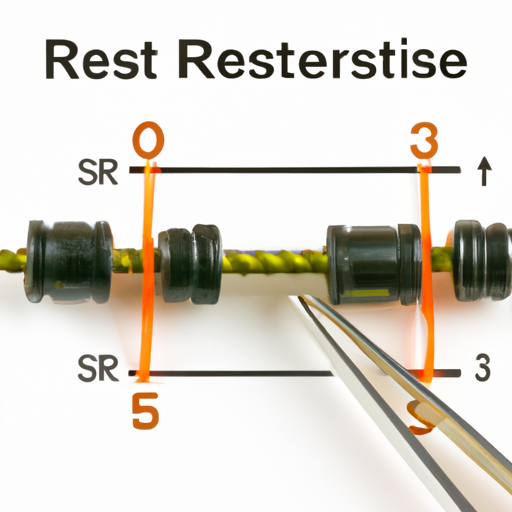What Industry Product Does the Adjustable Resistor Belong To?
I. Introduction
Adjustable resistors, often referred to as variable resistors, are essential components in a wide range of electronic devices. These components allow for the modification of resistance within a circuit, enabling users to control various parameters such as volume, brightness, and speed. The importance of adjustable resistors spans multiple industries, from consumer electronics to automotive systems, making them a critical element in modern technology. This article aims to explore the various applications of adjustable resistors, the industry products that utilize them, their advantages, challenges, and future trends in technology.
II. Overview of Adjustable Resistors
A. Explanation of What Adjustable Resistors Are
Adjustable resistors are components that allow for the manual adjustment of resistance in an electrical circuit. The two most common types of adjustable resistors are potentiometers and rheostats.
1. **Potentiometers**: These are three-terminal devices that can vary resistance by adjusting a wiper along a resistive track. They are commonly used for applications requiring fine control, such as volume knobs in audio equipment.
2. **Rheostats**: These are two-terminal devices primarily used for high-current applications. They are often employed in situations where a large amount of resistance needs to be adjusted, such as in motor speed control.
B. Key Characteristics and Specifications
When selecting an adjustable resistor, several key characteristics and specifications must be considered:
1. **Resistance Range**: This refers to the minimum and maximum resistance values that the component can provide. It is crucial for ensuring that the adjustable resistor can meet the specific needs of the application.
2. **Power Rating**: This indicates the maximum power the resistor can handle without overheating. It is essential to choose a resistor with an appropriate power rating to prevent damage during operation.
3. **Tolerance Levels**: This specification defines how much the actual resistance can vary from the stated value. Lower tolerance levels indicate higher precision, which is vital in applications requiring accurate adjustments.
III. Applications of Adjustable Resistors
Adjustable resistors find applications across various industries, each leveraging their unique capabilities to enhance functionality and user experience.
A. Consumer Electronics
In consumer electronics, adjustable resistors are ubiquitous.
1. **Volume Control in Audio Devices**: Potentiometers are commonly used in audio equipment to allow users to adjust the volume. By turning the knob, users can change the resistance, which in turn alters the audio signal's amplitude.
2. **Brightness Control in Displays**: Adjustable resistors are also used in display devices to control brightness levels. This feature enhances user comfort and energy efficiency.
B. Automotive Industry
The automotive industry utilizes adjustable resistors in several critical systems.
1. **Use in Dashboard Controls**: Adjustable resistors are employed in dashboard controls for features like dimming lights and adjusting climate settings, providing drivers with a customizable experience.
2. **Role in Electronic Stability Control Systems**: These resistors help in fine-tuning the performance of electronic stability control systems, ensuring optimal vehicle handling and safety.
C. Industrial Equipment
In industrial settings, adjustable resistors play a vital role in equipment functionality.
1. **Motor Speed Control**: Rheostats are often used to control the speed of electric motors in various machinery, allowing for precise adjustments based on operational needs.
2. **Temperature Regulation in Machinery**: Adjustable resistors can be used in temperature control systems, enabling operators to maintain optimal conditions for machinery operation.
D. Medical Devices
The medical field also benefits from the versatility of adjustable resistors.
1. **Calibration in Diagnostic Equipment**: Adjustable resistors are crucial in calibrating diagnostic devices, ensuring accurate readings and reliable performance.
2. **Adjustable Settings in Therapeutic Devices**: Many therapeutic devices, such as ultrasound machines, utilize adjustable resistors to allow healthcare professionals to customize treatment settings based on patient needs.
IV. Industry Products Utilizing Adjustable Resistors
Adjustable resistors are integral to numerous industry products, enhancing their functionality and user experience.
A. Audio Equipment
1. **Amplifiers**: In audio amplifiers, adjustable resistors are used to control gain levels, allowing users to tailor sound output to their preferences.
2. **Mixing Consoles**: In professional audio mixing, potentiometers are employed to adjust levels of different audio channels, providing sound engineers with precise control over the final output.
B. Home Appliances
1. **Washing Machines**: Adjustable resistors are used in washing machines to control water levels and spin speeds, enhancing efficiency and user convenience.
2. **Refrigerators**: In refrigerators, adjustable resistors help regulate temperature settings, allowing users to customize cooling levels based on their needs.
C. Automotive Systems
1. **Climate Control Systems**: Adjustable resistors are essential in automotive climate control systems, enabling users to set their desired temperature and airflow levels.
2. **Infotainment Systems**: In modern vehicles, adjustable resistors are used in infotainment systems for volume control and other user interface adjustments.
D. Industrial Automation
1. **Programmable Logic Controllers (PLCs)**: Adjustable resistors are used in PLCs to fine-tune input signals, ensuring accurate control of automated processes.
2. **Robotics**: In robotics, adjustable resistors help in calibrating sensors and motors, allowing for precise movements and actions.
V. Advantages of Using Adjustable Resistors
The use of adjustable resistors offers several advantages across various applications.
A. Flexibility in Design and Functionality
Adjustable resistors provide designers with the flexibility to create products that can be easily customized by users. This adaptability enhances the overall functionality of devices.
B. Cost-Effectiveness in Manufacturing
Incorporating adjustable resistors into products can reduce manufacturing costs by minimizing the need for multiple fixed resistors, streamlining the design process.
C. Enhanced User Experience Through Customization
Adjustable resistors allow users to tailor their experience, whether it’s adjusting the volume on a speaker or setting the temperature in a refrigerator. This level of customization leads to greater user satisfaction.
VI. Challenges and Considerations
Despite their advantages, adjustable resistors also present certain challenges.
A. Limitations in Precision and Accuracy
While adjustable resistors offer flexibility, they may not provide the same level of precision as fixed resistors or digital alternatives. This limitation can be critical in applications requiring high accuracy.
B. Environmental Factors Affecting Performance
Adjustable resistors can be sensitive to environmental factors such as temperature and humidity, which may affect their performance and longevity.
C. Alternatives to Adjustable Resistors
Digital potentiometers and other electronic alternatives are emerging as viable options, offering enhanced precision and programmability. These alternatives may eventually replace traditional adjustable resistors in certain applications.
VII. Future Trends in Adjustable Resistor Technology
The future of adjustable resistors is poised for innovation and growth.
A. Innovations in Materials and Design
Advancements in materials science may lead to the development of more durable and efficient adjustable resistors, enhancing their performance and lifespan.
B. Integration with Smart Technology
As smart technology continues to evolve, adjustable resistors may be integrated into IoT devices, allowing for remote control and automation of various functions.
C. Potential Impact of IoT on Adjustable Resistor Applications
The Internet of Things (IoT) could revolutionize the way adjustable resistors are used, enabling real-time adjustments and data collection for improved performance and user experience.
VIII. Conclusion
Adjustable resistors play a significant role in various industries, enhancing the functionality and user experience of countless products. From consumer electronics to automotive systems and medical devices, their versatility and adaptability make them indispensable components in modern technology. As we look to the future, innovations in materials, design, and integration with smart technology will likely shape the evolution of adjustable resistors, ensuring their continued relevance in an ever-changing technological landscape.
IX. References
- [Electronic Components: Adjustable Resistors](https://www.electronics-tutorials.ws/resistor/adjustable-resistors.html)
- [Applications of Potentiometers](https://www.electronics-notes.com/articles/electronic_components/potentiometer/potentiometer-applications.php)
- [The Role of Resistors in Automotive Systems](https://www.automotiveengineering.com/resistors-in-automotive-systems)
- [Future Trends in Resistor Technology](https://www.technewsworld.com/story/future-trends-in-resistor-technology-150123.html)
This blog post provides a comprehensive overview of adjustable resistors, their applications, and their significance across various industries, while also addressing future trends and challenges.












